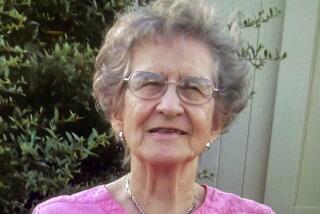Small-Town Residents Shocked, Outraged by Slaying : Kansas: Six months after a 79-year-old woman’s death, her friends fear her killers will evade punishment.
CUBA, Kan. — The regulars who gather around the oval Formica table at the back of the Cuba Cafe no longer look up from the daily special expecting to see Gladys Knedlik walk through the door.
The town of fewer than 300 wonders who will fill the midnight-to-6 a.m. shift for its annual Rock-a-Thon fund-raiser, the time slot no one else volunteered for, except Knedlik. The Presbyterian Church women will have to find somebody else to take notes at their meetings.
Knedlik’s friends may be spared her “kraut balls,” perhaps one of her less successful ventures in the kitchen. But her granddaughter at college no longer receives packages of baked goodies.
The loss of a vibrant and dependable thread in the web of this north-central Kansas community at first was met with shock, then grief. Six months after the 79-year-old woman was found shot and stabbed to death in her home just up the road near Narka, there is outrage.
“Our privacy has been invaded. Our world has been invaded,” said Narka resident Mary Cerny, who discussed “women’s lib” and other issues of the day with her longtime friend.
The loss of privacy--and concern that Knedlik’s attackers won’t be punished--most often surface in discussions of the killing.
But Rick Scheidt, a Kansas State University psychologist who specializes in rural studies and the psychology of aging, expects that the slaying also will get Republic County residents thinking and talking about rural crime.
Typically, fear of crime among the rural elderly isn’t the result of hearing about crimes happening to other people--after all, there isn’t much crime in isolated small towns, Scheidt said. Instead, their fear of crime usually comes from seeing small signs of decline such as a vacant lot or an empty storefront, he said.
“The scary thing about (Knedlik’s slaying) is that it’s a chance occurrence. This could be almost anybody,” he said. “I would imagine that it would send a ripple effect through the community for some time.”
Nonetheless, Scheidt doesn’t expect local residents to change their ways.
“People are trusting out here. I don’t think you’re going to see a real change in the rural ethic of openness and altruism unless it happened more frequently,” he said.
But Knedlik’s pastor, the Rev. Tom Ballard, says the community’s psyche has been changed forever.
“I don’t think we’ll ever be the same,” he said. “I don’t think we’ll ever trust strangers. Before, if there was a stranger, it’d be somebody we didn’t know. Now, we’ll be suspicious. And we weren’t before.”
Two young men from the Kearney, Neb., area have been charged with first-degree murder and felony theft in the Sept. 22 slaying. Both of them have pleaded not guilty and filed notices of an insanity defense.
Authorities allege that the killing was part of a series of crimes by Matthew Keen, 19, and Greg Baacke, 19, that began with residential burglaries in early August in Buffalo County, Neb.
When the car they are accused of stealing from their landlord got stuck on a dirt road in Kansas, they waited until dawn and approached a nearby farm house, police say. When Knedlik answered the door, one allegedly killed her as the other waited outside.
The two are accused of stealing Knedlik’s car and driving to Arkansas, where authorities found them in a city park.
Cuba postmistress Arlene Baxa says residents have sensed the emergence of crime for some time in their community. She cited, for example, a break-in at a local grocery store and the local drug scene. But those incidents are nothing compared to the blow dealt by Knedlik’s slaying, she said.
“Shoot, we’d leave keys in the car. Now we think about it,” she said. “It used to be somewhere else, not just up the road.”
Local residents recall Knedlik’s friendliness. They remember how she liked young people and regularly attended high school basketball games. They mention how she touched the arm of anyone she spoke to. Knedlik, they say, happily would have given her attackers anything they wanted.
“She would have set those kids down and said, ‘Have a cup of coffee and let’s talk about it’--if she’d had the chance. I don’t think she had the chance,” her friend Cerny said.
More to Read
Sign up for Essential California
The most important California stories and recommendations in your inbox every morning.
You may occasionally receive promotional content from the Los Angeles Times.









